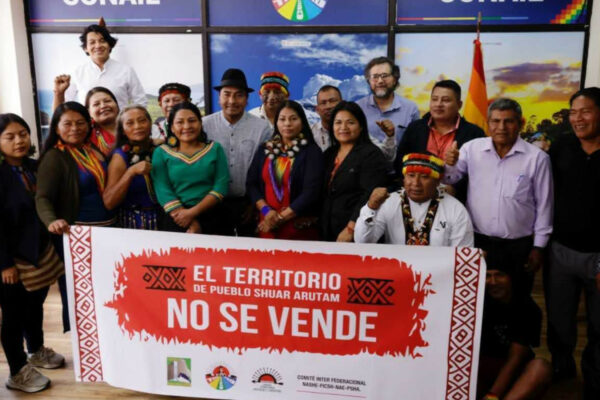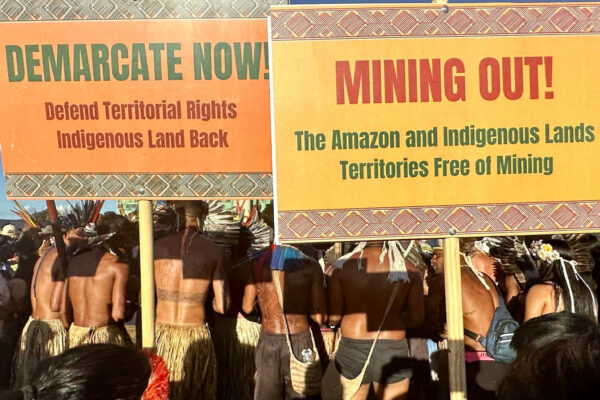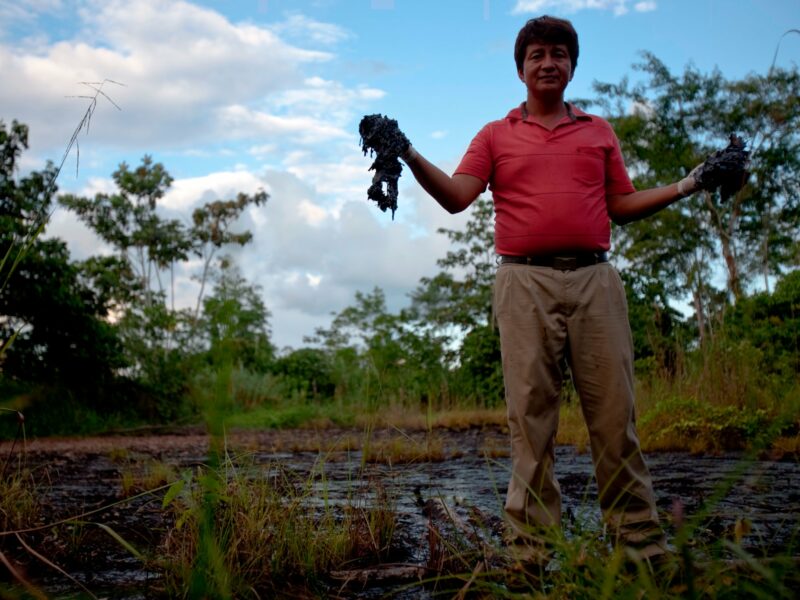San Ramon – After two weeks of meetings with the Ecuadorian delegates affected by operations of ChevronTexaco, religious leaders and other residents in the San Ramon-Danville area today agreed to organize a fact-finding mission to their Amazon communities. Their goal is to see firsthand the extent of contamination left in the Amazon and test claims by ChevronTexaco that it cleaned up the massive contamination caused by dumping toxic wastewater during its two decades of operations in Ecuador.
Local residents also agreed to form a support group for the Ecuadorians called “San Ramon-Danville Cares About Ecuador” that will organize the fact-finding mission and try to persuade CEO David O’Reilly to open a dialogue with the leaders of the Ecuadorian farmers and indigenous peoples. One of them the Cofan, has seen its population drop from 15,000 to 300 since the arrival of oil companies on their ancestral lands.
“The local support we have received in San Ramon is a huge breakthrough for us after having traveled so far,” said Rosa Moreno, a nurse from the community of San Carlos, which has roughly 30 old Texaco waste pits on its land. The group planned to stage a demonstration and rally with local supporters at company headquarters at 6001 Bollinger Canyon Road in San Ramon following the press conference. The rally is timed to coincide with the company’s shareholders meeting today in Midland, Texas.
“After talking to many people of this community it is clear that people believe that Chevron is fundamentally a company with a good conscience, and that its management probably did not know the full story when it inherited this problem from Texaco,” said Toribio Aguinda, a leader of the Cofan indigenous group.
Aguinda added: “It is a necessity for us to start talking, because for us this is a matter of our culture likely being extinguished forever if something is not done soon. And for the company, what it has done in our rainforest is simply not consistent with its stated policies about protecting the environment and respecting local communities. It is therefore in our mutual interest for the company to hear our case.”
While the Ecuadorians did not succeed in their quest to get 30 minutes of O’Reilly’s time, they promised to return to try again – this time with the backing of local religious leaders and what they hope will be some current and retired ChevronTexaco employees who live in San Ramon and Danville. Some of these employees are members of churches that have welcomed the delegation, and outreach to them is underway by local ministers.
Aguinda and Luis Yanza, another leader of the delegation, also called on the oil company’s employees to hear them out and not take at face value the claims made this week by the public relations department of Chevron in a company-wide email. The email, which was described to the delegation by a company employee, was apparently written in response to the presence of the delegation in Sam Ramon.
“We fear that the email is an attempt to silence employees from hearing the facts and engaging in a dialogue with us,” said Wilmer Piaguaje, one of the leaders of the delegation, which was hosted by Amazon Watch, an environmental organization based on Oakland and Los Angeles.
The company email, a copy of which was described to the delegation, asserts three main points that the Ecuadorians say are simply inaccurate and even contradictory – first, that Texaco spent $40 million in 1995 to clean up the contamination; second, that there is no evidence the contamination caused health problems; and third, that the company treated the toxic wastewater before dumping it. All of these assertions contradict the evidence provided by the Ecuadorians to local residents. For example, the Ecuadorians and their lawyers estimate a comprehensive clean-up could alone cost more than $1 billion, that rates of oil-related cancers have skyrocketed in communities where the company operated (an assertion backed by several scientific studies which can be made available to the press), and that the wastewater was dumped with some of the most dangerous carcinogens known to man at rates 1,000 times higher than that considered safe by the Environmental Protection Agency.
The Ecuadorians also assert that Texaco illegally lifted $4.5 billion in excess profits from their lands by failing re-inject the wastewater into the ground – money they argue should be returned to Ecuador. The company is estimated to have made between $20 and $30 billion in total profits from its operations in Ecuador.
That said, the Ecuadorians still believe it is possible to resolve the case through a meeting with O’Reilly and lawyers from both sides. A $1 billion lawsuit has been pending against the company for ten years. It recently received a boost when an Ecuadorian judge ordered O’Reilly to personally respond to the allegations in preparation for a trial in Ecuador, which is expected to start in the coming months.
The Ecuadorians listed these highlights from among many during their trip:
· Several religious leaders, led by Rev. Steve Harms of Peace Lutheran Church in Danville (phone: 925-648-7000) and Rabbi Dan Goldblatt of Beth Chaim Congregation in Sam Ramon (925-212-7942), are leading a letter writing campaign to convince the company to meet with the Ecuadorians. The letter urges O’Reilly to “put a human face on this dilemma and make real solutions work for all involved, without animosity.” The letter also thanked O’Reilly for encouraging ChevronTexaco “to act as a corporation of conscience” but called on the company to “live out its values together” with the visitors. The is signed by several leaders of congregations in the Tri-Valley area and will be circulated by the Interfaith Council, which has 90 congregations as members.
· On Monday of this week, the Mayor and entire city council of San Ramon officially welcomed the group in a one-hour ceremony in which stories of common problems relating to local governance were exchanged with the indigenous leaders. Mayor H. Abram Wilson and the council members provided each member of the delegation pins with the city seal and t-shirts. Vice-Mayor Jerry Cambra and his wife, Colleen Cambra, also issued a statement supporting the group in their capacity as private citizens.
· The delegation also met with a total of 800 students during three assemblies at a local high school in San Ramon, and 50 students signed up to participate in a fact-finding delegation to the region. Laura Mendua, a Cofan, was asked by some students why she wore a feather thru her nose. In turn, she asked them why some of the students wore body piercings. “The exchange was hilarious and really captured the human connection,” said Atossa Soltani, the director of Amazon Watch.
· Several area leaders have agreed to start a local support group tentatively called “San Ramon-Danville Cares About Ecuador”. This organization will work with Amazon Watch to organize fact-finding delegations to visit the four indigenous and two campesino communities of the individuals who came in the delegation to San Ramon. The group will also continue to call on Mr. O’Reilly to open a dialogue with the Ecuadorians and their legal representatives.
Yanza and the other leaders called on ChevronTexaco’s 5,000 employees in San Ramon to open a dialogue with the Ecuadorians, even if O’Reilly himself refuses to meet. They said they will return soon to reach out both to the company’s employees and retired employees who live in the area, some of whom already have spoken to the Ecuadorians in various presentations and cultural events held at area churches and schools and in front of company headquarters in San Ramon.
Members of the delegation, including five survivors of a nearly extinct indigenous nationality called the Cofan, traveled on foot, canoe, bus, and jet to San Ramon to press their cause that Texaco has disrespected and decimated their cultures. For most of them, it was their first time on an airplane, their first visit to the United States, and their first contact with running water from faucets. Five indigenous groups are on the verge of extinction in the area where the company operated. In addition to the Cofan, they are the Secoya, Siona, Huaorani, and Quichua.
A lawyer for the Ecuadorians, Steven Donziger, also disputed the company’s claim that they could not meet with the Ecuadorians while the litigation is pending. “Parties meet all the time while a lawsuit is in court because it costs far less to talk than to litigate,” he said. “This should be particularly true in a case such as this, where the barrel of cancer is cocked, loaded, and aimed at the heads of tens of thousands of vulnerable people. Chevron did not cause this problem, but it is now their responsibility to deal with it.”
#
Amazon Rainforest Destruction Twice the Size of the Exxon Valdez
Press Conference and March to Company Headquarters Thursday at 11am













